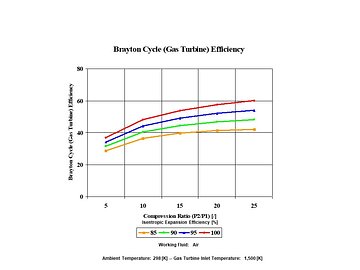Power Cycles Ideal vs Real Operation Analysis
Last Updated 10/2025
English
Full Lifetime Access
Self-Paced
Finish in
60 mins!
Finish in
60 mins!
Made for for
Employees
and
Supervisors
Employees
and
Supervisors
No Certificate
Provided
Provided
Mobile -
Friendly
Access
Friendly
Access
What you'll learn
In this course, the student gets familiar with the simple and basic power cycles and their T - s and p - V diagrams
Ideal vs real operation and major performance trends
Skills covered in this course
Description
The simple and basic power cycles (Brayton Cycle, Otto Cycle and Diesel Cycle) are presented in this course material.In the presented power cycle analysis, air is used as the working fluid.
For each power cycle, the thermal efficiency derivation is presented with a simple mathematical approach. Also, for each power cycle, a T - s diagram and cycle major performance trends (thermal efficiency, specific power output and power output) are plotted in a few figures as a function of compression ratio, turbine inlet temperature and/or final combustion temperature, working fluid mass flow rate and both isentropic compression and expansion efficiency. It should be noted that this course material does not deal with costs (capital, operational or maintenance).
Table of Contents
Brayton Cycle (Gas Turbine) for Power Application
Analysis
Assumptions
Governing Equations
Input Data
Results
Conclusions
Otto Cycle
Analysis
Assumptions
Governing Equations
Input Data
Results
Conclusions
Diesel Cycle
Analysis
Assumptions
Governing Equations
Input Data
Results
Conclusions
Author
His engineering professional experience of forty (40) years includes performing analytical modeling and computer modeling of physical properties, power cycles, power cycle components/processes and compressible flow components. Also, it includes conducting conceptual design, analysis and evaluation of energy conversion systems for basic and simple power and propulsion cycles.
Frequently Asked Questions
This course is designed for employees and supervisors who need to complete Power Cycles Ideal vs Real Operation Analysis training
Yes. This course is designed to meet applicable federal requirements and commonly mandated state standards. Always confirm specific state or industry requirements with your local regulations.
The course takes approximately 60 minutes to complete and can be paused and resumed at any time.
No. This course does not include a certificate of completion.
Yes. You can assign this course to individuals or groups using Coggno’s LMS, or purchase multiple seats for your team.
Yes. This course can be exported for delivery in most learning management systems (SCORM compatible).
Yes. The course is fully self-paced and available 24/7.
Yes. This course includes a knowledge check to reinforce learning and verify completion.
Learners have lifetime access from the date of purchase.
Yes. A preview is available so you can review the course format and content before purchasing.
Yes. Content is reviewed and updated as regulations and best practices change.
No. This course is not included with the Prime Subscription and must be purchased separately.
Yes. Refund requests can be submitted within 30 days of purchase.






